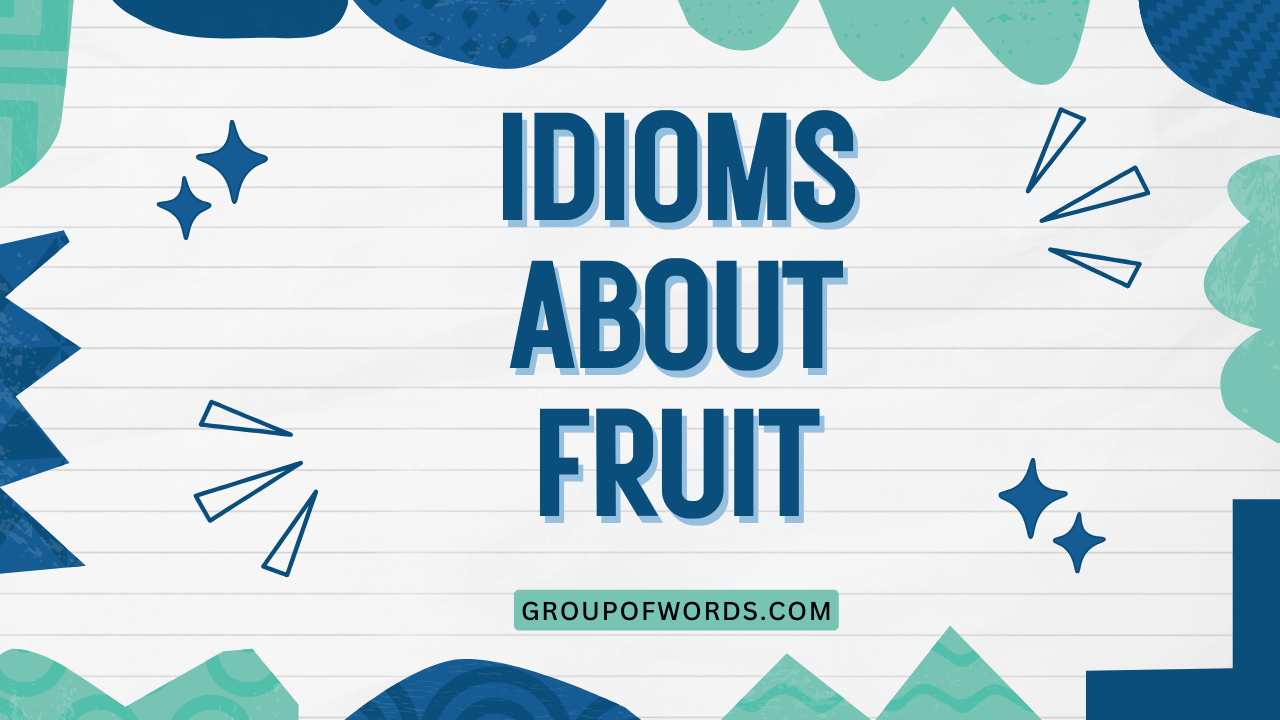Fruitful Language: Mastering Idioms About Fruit in English
Idioms add color and depth to the English language, making communication more vivid and engaging. Among the vast collection of idioms, those involving fruit are particularly common and often carry nuanced meanings that might not be immediately obvious.
Understanding these idioms is crucial for anyone looking to improve their English comprehension and fluency. This article will delve into the world of fruit-related idioms, providing clear definitions, examples, and practical exercises to help you master their usage.
Whether you’re an ESL learner, a student preparing for an English exam, or simply someone who enjoys exploring the intricacies of language, this guide will equip you with the knowledge to use these idioms confidently and accurately.
Table of Contents
- Introduction
- Definition of Idioms About Fruit
- Structural Breakdown
- Types and Categories of Fruit Idioms
- Examples of Fruit Idioms
- Usage Rules for Fruit Idioms
- Common Mistakes When Using Fruit Idioms
- Practice Exercises
- Advanced Topics
- Frequently Asked Questions
- Conclusion
Definition of Idioms About Fruit
An idiom is a phrase or expression whose meaning cannot be understood from the ordinary meanings of the words it contains. Instead, the phrase has a figurative meaning known through common usage.
Fruit idioms are those that incorporate the names of fruits to convey a particular idea, emotion, or situation. These idioms add color and richness to the English language, but they can also be confusing for non-native speakers due to their non-literal interpretations.
Therefore, understanding the context and intended meaning is essential when encountering these expressions.
Fruit idioms can be classified based on the specific fruit used and the concept they represent. For instance, idioms using “apple” often relate to goodness or health, while those using “lemon” typically convey disappointment or imperfection.
The function of these idioms is to provide a more expressive and often more humorous way of communicating ideas. They are commonly used in everyday conversation, literature, and even business contexts.
However, it’s important to use them appropriately, considering the audience and the formality of the situation.
Structural Breakdown
The structure of fruit idioms can vary, but most commonly they follow a pattern of incorporating the fruit name into a phrase that includes verbs, adjectives, or other nouns. The specific structure depends on the idiom itself, and the grammatical function of the fruit name within the phrase can also vary.
For example, in the idiom “the apple of one’s eye,” “apple” functions as a noun within a possessive construction. In “go bananas,” “bananas” functions as the object of the verb “go.”
Understanding the grammatical role of the fruit name within the idiom can sometimes provide clues to its meaning, but ultimately, the meaning needs to be learned through exposure and context. Idioms often defy standard grammatical rules and logical interpretations, which is what makes them unique and sometimes challenging.
Recognizing the idiomatic nature of a phrase is the first step in understanding its meaning and using it correctly.
Types and Categories of Fruit Idioms
Fruit idioms can be categorized based on the themes or concepts they represent. This categorization helps in understanding the overall meaning and usage of different idioms.
Here are some common categories:
Idioms Related to Ripeness and Maturity
These idioms often relate to the state of being ready or developed, similar to how fruit ripens over time. They can describe people or situations that are mature, prepared, or at their peak.
Idioms Related to Goodness and Quality
Some fruit idioms are used to describe something or someone that is excellent, desirable, or of high quality. These idioms often associate the fruit with positive attributes.
Idioms Related to Sourness and Displeasure
These idioms often convey feelings of disappointment, bitterness, or dissatisfaction. They use fruits known for their sour taste to represent negative experiences or qualities.
Idioms Related to Abundance and Plenty
Certain fruit idioms symbolize a large quantity or a plentiful supply of something. These idioms often evoke images of overflowing baskets of fruit.
Idioms Using Fruit for Comparison
Some idioms use fruit to draw comparisons between different things, highlighting similarities or differences in a figurative way. These comparisons can be used to emphasize certain qualities or characteristics.
Examples of Fruit Idioms
This section provides extensive examples of fruit idioms, categorized by the specific fruit they contain. Each example includes the idiom, its meaning, and example sentences to illustrate its usage.
Examples with “Apple”
The word “apple” appears in several common idioms, often associated with health, goodness, or something cherished. The following table provides examples of apple-related idioms.
| Idiom | Meaning | Example Sentence |
|---|---|---|
| The apple of one’s eye | Someone who is cherished above all others. | His youngest daughter is the apple of his eye. |
| As American as apple pie | Quintessentially American. | Baseball and hot dogs are as American as apple pie. |
| A bad apple | A person who negatively affects others in a group. | One bad apple can spoil the whole barrel. |
| Upset the apple cart | To disrupt or ruin a plan or situation. | His unexpected resignation upset the apple cart for their project. |
| Compare apples and oranges | To compare two things that are fundamentally different. | You can’t compare the performance of a car to that of a bicycle; it’s like comparing apples and oranges. |
| Polish the apple | To try to gain favor by flattery or gifts. | He’s always trying to polish the apple with his boss. |
| A bite of the apple | An opportunity or chance to do something. | Everyone deserves a bite of the apple in this company. |
| Apple-polisher | A person who tries to gain favor by flattery. | Don’t be an apple-polisher; just do your job well. |
| How do you like them apples? | A boastful challenge or expression of triumph. | We won the game! How do you like them apples? |
| Rotten apple | A corrupt or dishonest person. | The investigation revealed a rotten apple within the police department. |
| Apple of discord | Something that causes disagreement or conflict. | The inheritance became an apple of discord among the siblings. |
| Crab apple | A sour or unpleasant person. | Don’t be such a crab apple; try to be more positive. |
| The Big Apple | A nickname for New York City. | She’s always dreamed of living in The Big Apple. |
| Get a bite of the apple | To get a chance or opportunity. | I’m excited to finally get a bite of the apple in this new role. |
| Take a bite out of crime (parody) | To make a small dent in a larger problem (often humorous). | By volunteering at the community center, we can take a bite out of crime. |
| As easy as apple pie | Very easy or simple. | The recipe is as easy as apple pie; anyone can make it. |
| Apple doesn’t fall far from the tree | A child resembles their parents in character or behavior. | He’s a talented musician, just like his father; the apple doesn’t fall far from the tree. |
| The forbidden apple | Something tempting but dangerous or wrong. | For him, gambling was the forbidden apple, always tempting him back. |
| Second bite at the apple | Another chance to do something. | After failing the first time, he got a second bite at the apple and succeeded. |
| As sound as an apple | Healthy and strong. | After a good night’s sleep, I feel as sound as an apple. |
Examples with “Banana”
The word “banana” is often used in idioms to describe someone who is acting crazy or silly. Here’s a table showcasing banana-related idioms.
| Idiom | Meaning | Example Sentence |
|---|---|---|
| Go bananas | To become very excited or crazy. | The crowd went bananas when the band came on stage. |
| Second banana | A person in a subordinate position, often the sidekick to the main performer. | He’s always been the second banana in the comedy duo. |
| Banana republic | A small nation, usually tropical, dependent on the export of one product (like bananas) and often with a corrupt government. | The country was described as a banana republic due to its unstable political situation. |
| Banana oil | Nonsense or insincere flattery. | Don’t listen to his banana oil; he’s just trying to manipulate you. |
| Top banana | The chief comedian or most important person in a group. | He’s the top banana in the office, always cracking jokes and keeping spirits high. |
| A-peel-ing (playing on “banana peel”) | Attractive or interesting (playful usage). | The new marketing campaign is very a-peel-ing to young consumers. |
| Slip on a banana peel | To make a foolish mistake. | He slipped on a banana peel during the presentation and embarrassed himself. |
| Loads of appeal (similar to A-peel-ing) | Very attractive or interesting. | That new sports car has loads of appeal to young drivers. |
| Go ape (similar to ‘go bananas’) | To become very excited or enthusiastic. | The kids went ape when they saw the new puppy. |
| Drive someone bananas | To annoy or irritate someone greatly. | My neighbor’s loud music is driving me bananas. |
| The whole banana | Everything, the entire thing. | He wanted the whole banana, not just a slice. |
| Big banana | An important or influential person. | He’s a big banana in the company, so be respectful. |
| Not worth a banana | Worthless, of no value. | That old car isn’t worth a banana; it’s completely broken down. |
| Banana bread | A situation that is easy or simple. | Getting this project done is like baking banana bread. |
| Banana hammock | A slang term for tight-fitting swimwear for men. | He was wearing a banana hammock at the beach. |
| Banana seat | A long, cushioned seat on a bicycle. | My old bicycle had a banana seat that was really comfortable. |
| Banana split | A dessert made with a banana, ice cream, and toppings. | Let’s get a banana split after dinner. |
| Banana boat | A long, inflatable boat pulled by a motorboat. | We went for a ride on a banana boat at the resort. |
| Banana cake | A type of cake made with mashed bananas. | She baked a delicious banana cake for the party. |
| Banana clip | A type of hair accessory. | She used a banana clip to hold her hair back. |
Examples with “Cherry”
The word “cherry” is often associated with something pleasant or desirable. The following table provides cherry-related idioms.
| Idiom | Meaning | Example Sentence |
|---|---|---|
| Cherry-pick | To select only the best or most desirable items. | The company tends to cherry-pick the most profitable projects. |
| Life is just a bowl of cherries | Life is easy and pleasant. | For her, life is just a bowl of cherries since she won the lottery. |
| A cherry on top | A final, positive addition to something already good. | Winning the award was the cherry on top of a successful year. |
| Pop someone’s cherry | To be the first to do something with someone (often used in a sexual context, so be careful). | He popped his cherry by voting in his first election. |
| Cherry red | A bright, vibrant shade of red. | She wore a cherry red dress to the party. |
| Cherry bomb | A small, powerful firework. | The kids were setting off cherry bombs on the Fourth of July. |
| Cherry blossom | The flower of a cherry tree. | The cherry blossoms were in full bloom in the park. |
| Cherry cordial | A chocolate-covered cherry filled with liqueur. | She offered me a cherry cordial after dinner. |
| Cherrystone clam | A type of clam. | We ordered cherrystone clams at the seafood restaurant. |
| Cherry juice | The juice extracted from cherries. | I love drinking cherry juice in the morning. |
| Cherry pit | The hard seed inside a cherry. | Be careful not to swallow the cherry pit. |
| Cherry tomato | A small, round tomato. | We added cherry tomatoes to the salad. |
| Cherry tree | A tree that produces cherries. | We planted a cherry tree in the backyard. |
| Cherry wine | A wine made from cherries. | We toasted with cherry wine at the wedding. |
| Cherry-cheeked | Having rosy cheeks. | The child was cherry-cheeked from playing in the snow. |
| Cherry lips | Red, attractive lips. | She had cherry lips and a bright smile. |
| Cherry flavor | The taste of cherries. | I love the cherry flavor of this candy. |
| Cherry cough drops | Medicated lozenges flavored with cherry. | I took cherry cough drops to soothe my throat. |
| Cherry pie | A pie made with cherries. | She baked a delicious cherry pie for dessert. |
| Cherry brandy | A brandy flavored with cherries. | He ordered a glass of cherry brandy after dinner. |
Examples with “Lemon”
The word “lemon” is often used to describe something defective or disappointing. Here are some examples of lemon-related idioms.
| Idiom | Meaning | Example Sentence |
|---|---|---|
| A lemon | Something that is defective or doesn’t work properly. | I bought a used car, but it turned out to be a lemon. |
| Sour as a lemon | Having a bitter or unpleasant attitude. | He’s been as sour as a lemon ever since he lost his job. |
| When life gives you lemons, make lemonade | To find something positive in a negative situation. | She lost her job, but she decided to start her own business; when life gives you lemons, make lemonade. |
| Lemon law | A law that protects consumers who buy defective vehicles. | Thanks to the lemon law, I was able to get a refund for my faulty car. |
| Lemonade | A drink made from lemons, sugar, and water. | She made a pitcher of lemonade for the picnic. |
| Lemon zest | The outer peel of a lemon, used for flavoring. | The recipe calls for lemon zest to add flavor to the cake. |
| Lemon curd | A spread made from lemons, sugar, butter, and eggs. | She spread lemon curd on her toast. |
| Lemon meringue pie | A pie filled with lemon custard and topped with meringue. | He ordered a slice of lemon meringue pie for dessert. |
| Lemon sole | A type of flatfish. | We had lemon sole for dinner. |
| Lemon yellow | A bright, light yellow color. | She painted her room lemon yellow. |
| Lemon drops | Hard candies flavored with lemon. | He offered me a lemon drop. |
| Lemon juice | The juice extracted from lemons. | She added lemon juice to the salad dressing. |
| Lemon scent | The fragrance of lemons. | The cleaning product had a fresh lemon scent. |
| Lemon tree | A tree that produces lemons. | We planted a lemon tree in the garden. |
| Lemon verbena | A plant with lemon-scented leaves. | She brewed a tea with lemon verbena. |
| Lemon extract | A flavoring made from lemons. | She added lemon extract to the cookies. |
| Lemon balm | A herb with a lemon scent. | She used lemon balm to make tea. |
| Lemon oil | An oil extracted from lemon peels. | She used lemon oil to polish the furniture. |
| Lemon grass | A tropical grass with a lemon flavor. | She added lemon grass to the soup. |
| Lemon poppy seed muffin | A muffin flavored with lemon and poppy seeds. | I had a lemon poppy seed muffin for breakfast. |
Examples with “Peach”
The word “peach” often describes someone or something that is excellent or pleasant. Here are examples of peach-related idioms.
| Idiom | Meaning | Example Sentence |
|---|---|---|
| Peachy | Excellent, wonderful, or pleasant. | Everything’s peachy! We got the deal. |
| A real peach | A very pleasant or admirable person. | She’s a real peach; always willing to help others. |
| Life is a bowl of peaches | Life is easy and pleasant. | Since he retired, life has been a bowl of peaches. |
| Peach fuzz | The soft, downy hair on a peach or on a young man’s face. | He had peach fuzz on his cheeks. |
| Peach cobbler | A baked dessert made with peaches. | She baked a delicious peach cobbler for the summer barbecue. |
| Peach ice cream | Ice cream flavored with peaches. | We had peach ice cream for dessert. |
| Peach tree | A tree that produces peaches. | We planted a peach tree in the orchard. |
| Peach blossom | The flower of a peach tree. | The peach blossoms were beautiful in the spring. |
| Peach brandy | A brandy flavored with peaches. | He ordered a glass of peach brandy after dinner. |
| Peach jam | A preserve made from peaches. | She spread peach jam on her toast. |
| Peach color | A pale orange-pink color. | She painted her room a peach color. |
| Peach pie | A pie made with peaches. | She baked a delicious peach pie for dessert. |
| Peach preserves | A preserve made from peaches. | She canned peach preserves every summer. |
| Peach smoothie | A blended drink made with peaches. | I made a peach smoothie for breakfast. |
| Peach iced tea | Iced tea flavored with peaches. | She ordered a peach iced tea at the restaurant. |
| Peach sorbet | A frozen dessert made with peaches. | We had peach sorbet for dessert. |
| Peach yogurt | Yogurt flavored with peaches. | I had peach yogurt for a snack. |
| Peach salad | A salad that includes peaches. | She made a peach salad with feta cheese and mint. |
| Peach salsa | A salsa made with peaches. | We served peach salsa with grilled chicken. |
| Just peachy | Everything is fine and well. | How are you doing? Just peachy, thanks! |
Usage Rules for Fruit Idioms
Using fruit idioms correctly involves understanding their specific meanings and contexts. Here are some general rules to follow:
- Context is Key: Always consider the context in which you’re using the idiom. The same idiom can have different connotations depending on the situation.
- Audience Awareness: Be mindful of your audience. Some idioms may not be appropriate for formal settings or for those who are not familiar with colloquial English.
- Accuracy: Ensure you understand the precise meaning of the idiom before using it. Misusing an idiom can lead to confusion or miscommunication.
- Natural Flow: Integrate the idiom naturally into your speech or writing. Avoid forcing idioms into sentences where they don’t fit.
- Cultural Sensitivity: Some idioms may have cultural nuances or sensitivities. Be aware of these and use idioms respectfully.
While fruit idioms are generally used figuratively, it’s important to maintain grammatical correctness within the idiom itself. For example, if an idiom requires a specific verb tense, adhere to that tense.
Also, be aware that some idioms are more common in certain regions or dialects of English. Familiarize yourself with the common idioms in your area to use them effectively.
Common Mistakes When Using Fruit Idioms
One of the most common mistakes is taking idioms literally. Because idioms have figurative meanings, translating them word-for-word often leads to nonsensical interpretations.
Another frequent error is using idioms in the wrong context or with the wrong audience. For example, using a very informal idiom in a formal business presentation would be inappropriate.
Here are some examples of common mistakes and their corrections:
| Incorrect | Correct | Explanation |
|---|---|---|
| He is the apple of my face. | He is the apple of my eye. | The correct idiom is “apple of my eye,” not “apple of my face.” |
| She went bananas literally when she saw the monkeys. | She went bananas when she saw the monkeys. | The word “literally” negates the idiomatic meaning of “went bananas,” which means “became very excited.” |
| Life is a basket of cherries | Life is a bowl of cherries | The correct idiom is “a bowl of cherries,” not “a basket of cherries.” |
| The car was a lemon so I added lemon juice. | The car was a lemon, so I returned it to the dealer. | Adding lemon juice has nothing to do with a car being defective. |
| She is a real peach, she always argues. | She is a real peach, she is always helpful. | A “real peach” means someone is pleasant or admirable, not argumentative. |
Practice Exercises
Test your understanding of fruit idioms with these practice exercises. Choose the correct idiom to complete each sentence.
| Question | Options | Answer |
|---|---|---|
| 1. My daughter is ______________. I love her so much. | a) the lemon of my eye b) the peach of my life c) the apple of my eye | c) the apple of my eye |
| 2. The crowd ____________ when their favorite band started playing. | a) went lemons b) went bananas c) went peaches | b) went bananas |
| 3. After a series of unfortunate events, he said, “_____________” | a) Life is a lemon b) Life is a peach c) Life is a bowl of cherries | c) Life is a bowl of cherries |
| 4. That old car is ____________. It doesn’t even start! | a) a peach b) a lemon c) an apple | b) a lemon |
| 5. She’s ____________; she’s always willing to lend a hand. | a) a sour apple b) a real peach c) a bad apple | b) a real peach |
| 6. It’s like ____________ to say that cats are the same as dogs. | a) Comparing apples and bananas b) Comparing lemons and peaches c) Comparing apples and oranges | c) Comparing apples and oranges |
| 7. Winning the competition was just ____________ on a great year. | a) the cherry on top b) the lemon on top c) the apple on top | a) the cherry on top |
| 8. He tried to ____________ with the boss, but it didn’t work. | a) crab apple b) polish the apple c) taste the apple | b) polish the apple |
| 9. The new policy ____________ for the entire department. | a) upset the peach cart b) upset the lemon cart c) upset the apple cart | c) upset the apple cart |
| 10. The company decided to ____________ for the best employees from the other branch. | a) peach-pick b) apple-pick c) cherry-pick | c) cherry-pick |
Advanced Topics
For advanced learners, exploring the etymology and historical context of fruit idioms can provide a deeper understanding of their meanings. Researching the origins of phrases like “the apple of one’s eye” or “go bananas” can reveal interesting insights into the cultural and linguistic influences that shaped these expressions.
Additionally, analyzing how fruit idioms are used in literature and media can offer a more nuanced appreciation of their artistic and communicative potential.
Another advanced topic is the study of regional variations in fruit idiom usage. Some idioms may be more common in certain regions of the English-speaking world than others.
Understanding these regional differences can enhance your ability to communicate effectively with people from diverse backgrounds. Furthermore, exploring the translation of fruit idioms into other languages can highlight the challenges and complexities of cross-cultural communication.
Some idioms may have direct equivalents in other languages, while others may require more creative adaptations to convey the same meaning.
Frequently Asked Questions
Here are some frequently asked questions about fruit idioms:
- What is an idiom?
An idiom is a phrase or expression whose meaning cannot be understood from the ordinary meanings of the words it contains. Instead, the phrase has a figurative meaning known through common usage.
- Why are fruit idioms important to learn?
Fruit idioms add color and depth to the English language. Understanding them helps you comprehend spoken and written English more effectively and allows you to communicate more expressively.
- How can I learn fruit idioms effectively?
The best way to learn fruit idioms is through exposure and context. Read widely, listen to native speakers, and pay attention to how idioms are used in different situations. Practice using them in your own speech and writing.
- Are fruit idioms common in everyday conversation?
Yes, fruit idioms are quite common in everyday conversation, as well as in literature, movies, and other forms of media. They are an integral part of the English language.
- Can I use fruit idioms in formal writing?
It depends on the context and the specific idiom. Some fruit idioms are more informal than others. Consider your audience and the tone of your writing before using an idiom in a formal setting.
- What should I do if I don’t understand a fruit idiom?
If you encounter a fruit idiom you don’t understand, try to infer its meaning from the context. If that doesn’t work, look it up in a dictionary or ask a native speaker for clarification.
- Are there any fruit idioms that I should avoid using?
Some fruit idioms may be considered offensive or inappropriate in certain contexts. Be mindful of the potential impact of your words and avoid using idioms that could be hurtful or insensitive.
- How do I know when to use a fruit idiom?
The best way to know when to use a fruit idiom is to familiarize yourself with its meaning and usage. Pay attention to how native speakers use idioms and try to emulate their style. Over time, you will develop a sense of when an idiom is appropriate and effective.
Conclusion
Mastering fruit idioms is a rewarding journey that enhances your understanding and appreciation of the English language. By learning the definitions, usage rules, and common mistakes associated with these expressions, you can communicate more effectively and confidently.
Practice using fruit idioms in various contexts and continue to expand your knowledge through reading and listening. Remember that language learning is an ongoing process, and every new idiom you learn brings you one step closer to fluency.
Fruit idioms add a unique flavor to the English language, and with consistent effort and attention, you can use them to enrich your communication and express yourself more vividly. Embrace the challenge, enjoy the learning process, and soon you’ll be speaking English like a true native.






